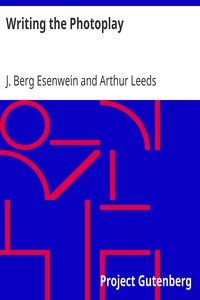Writing the Photoplay by J. Berg Esenwein and Arthur Leeds
"Writing the Photoplay" by J. Berg Esenwein and Arthur Leeds is a comprehensive guide on the craft of screenwriting that was written in the early 20th century. This instructional text aims to equip aspiring writers with the necessary tools and techniques for constructing effective photoplays, which are cinematic stories significantly relying on visual storytelling and action. It not only delves into the structural components of a photoplay but also emphasizes the distinct
elements that set it apart from traditional prose writing. The opening of "Writing the Photoplay" introduces the concept of a photoplay as a narrative expressed largely through action and pantomime, with supporting descriptive text occasionally displayed on screen. Esenwein and Leeds clarify the importance of visual storytelling, arguing that writers need to focus on dynamic actions rather than dialogue and prose details. They highlight the necessity for a well-structured plot, accessible character motivations, and the various sequences that compose a compelling script. This foundational understanding sets the stage for the deeper exploration of writing mechanics and techniques that will follow in subsequent chapters. (This is an automatically generated summary.)
Read or download for free
| How to read | Url | Size | |||
|---|---|---|---|---|---|
| Read now! | https://www.gutenberg.org/ebooks/17903.html.images | 733 kB | |||
| EPUB3 (E-readers incl. Send-to-Kindle) | https://www.gutenberg.org/ebooks/17903.epub3.images | 1.1 MB | |||
| EPUB (older E-readers) | https://www.gutenberg.org/ebooks/17903.epub.images | 1.1 MB | |||
| EPUB (no images, older E-readers) | https://www.gutenberg.org/ebooks/17903.epub.noimages | 339 kB | |||
| Kindle | https://www.gutenberg.org/ebooks/17903.kf8.images | 1.7 MB | |||
| older Kindles | https://www.gutenberg.org/ebooks/17903.kindle.images | 1.6 MB | |||
| Plain Text UTF-8 | https://www.gutenberg.org/ebooks/17903.txt.utf-8 | 625 kB | |||
| Download HTML (zip) | https://www.gutenberg.org/cache/epub/17903/pg17903-h.zip | 1.0 MB | |||
| There may be more files related to this item. | |||||
Similar Books
About this eBook
| Author | Esenwein, J. Berg (Joseph Berg), 1867-1946 |
|---|---|
| Author | Leeds, Arthur |
| Title | Writing the Photoplay |
| Credits | E-text prepared by Audrey Longhurst, Linda Cantoni, and the Project Gutenberg Online Distributed Proofreading Team |
| Reading Level | Reading ease score: 65.5 (8th & 9th grade). Neither easy nor difficult to read. |
| Language | English |
| LoC Class | PN: Language and Literatures: Literature: General, Criticism, Collections |
| Subject | Motion picture authorship |
| Category | Text |
| EBook-No. | 17903 |
| Release Date | Mar 3, 2006 |
| Most Recently Updated | Dec 13, 2020 |
| Copyright Status | Public domain in the USA. |
| Downloads | 309 downloads in the last 30 days. |
| Project Gutenberg eBooks are always free! | |

